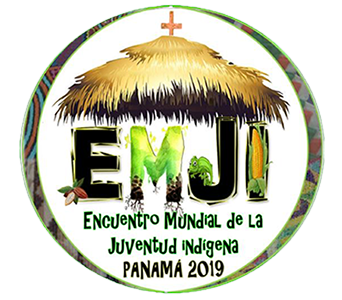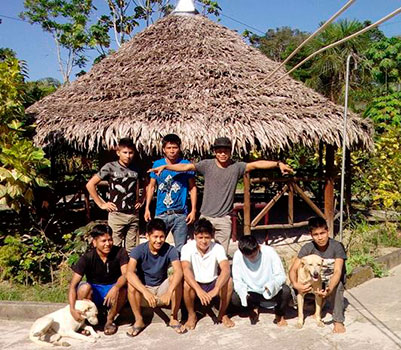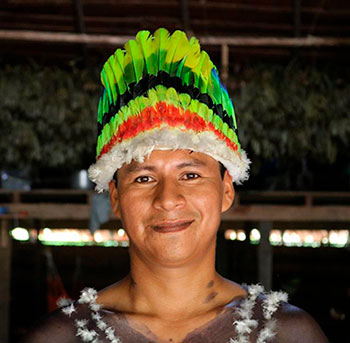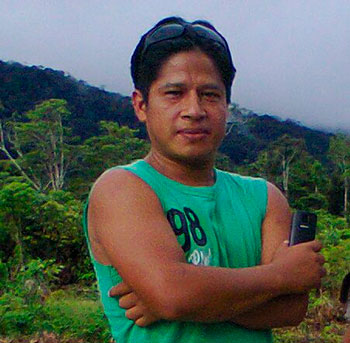WORLD INDIGENOUS YOUTH GATHERING

WHY THE EMJI WAS CREATED
After the Pope Francis’ announcement of Panama as the site of the World Youth Day (WYD) 2019, among the various proposals raised to involve the indigenous youth in this event and show the "indigenous face" of the Church, emerged the idea to have, for the first time, a pre-meeting specifically aimed at young indigenous peoples coming from around the world. The proposal took strength in a regional meeting of indigenous pastoral in Chiapas, Mexico, October 2016. After a series of meetings, and with the blessing of the Panamanian Episcopal Conference, it was decided to hold the meeting during the so-called "days in the dioceses" in the community of Soloy.
Download this presentation as PDF
WHEN THE EMJI WILL BE
The EMJI will take place in Soloy, Comarca Ngäbe-Bugle, Diocese of David, Panama, from January 17 to 21, 2019. At the end of the EMJI, the participants will continue on to Panama City for the World Youth Day, which will take place from January 22 to 27, 2019.
The EMJI is open to young indigenous people worldwide, together with their chaperones (priests, religious, youth advisors, etc.). The National Coordination of Indigenous Pastoral, Panama-CONAPI, entity belonging to the Panamanian Episcopal Conference, is in charge of the central organization, while each congregation or diocese is in charge of organizing its group so that it can reach Soloy and participate in the event. It is the first event of this kind, which seeks to bring together young people from the various first peoples of the world, to reflect and exchange from the millennial richness of their cultures.
You can follow the EMJI in social networks: emji2019 (Facebook, Twitter, Instagram, YouTube); and on the official website: emji2019.org
LASALLIAN STUDENT COMMUNITY

Taking into account the importance of a global meeting of this kind, Takiwasi considers necessary to support our allies so that they can send indigenous youth to this event in representation of Peru and the Amazon. One is the association headed by Brother Paul John McAuley, of the Congregation of the Brothers of La Salle, who has been in charge since 2006 of the Lasallian Ecumenical Student Community, located in the city of Iquitos, in the Peruvian Amazon. Brother Paul is widely known in Iquitos for his work defending indigenous communities and the biodiversity of the Amazon rainforest and is also the president of the Environmental Network of Loreto (RAL).
The Lasallian Student Community is composed of 19 indigenous students who, thanks to this center, can study in higher institutes or universities and thus continue with their education. The students come from six different ethnic groups. Their families live in towns near the city in extreme poverty conditions and De La Salle Brothers try to cover the basic needs (accommodation, food and study materials) of the students until their graduation. Although the lack of economic resources consistently limits the activities of the Community, its impact on the lives of these indigenous youth is remarkable.
OUR REPRESENTATIVES AT THE EMJI
Takiwasi wish to support Brother Paul so that he can organize a group of representatives composed by 4 indigenous youths and manage a project to allow them to participate in the EMJI 2019. This group will be made up bringing together young people belonging to the Lasallian Community and other young indigenous people of extraordinary actions that Takiwasi has been supporting in recent years.
The 4 representatives are the following:
- Rubén Medina Robledo

Rubén is an indigenous leader from the Uitoto Murui tribe, Peruvian Amazon. His hometown is El Estrecho, located on the Putumayo River, at the border with Colombia. His tribe was one of the victims of the horrible crime perpetrated 100 years ago, at the time of the rubber exploitation in the Peruvian Amazon, which left in the collective memories the barbarism that comes hand in hand with the deterioration of its culture, economy and history. Rubén is married and has two children, Finora 5 years old and Enoka 3 years old. In 2004 Rubén moved from his community to the city of Iquitos with the aim of building a professional future for himself. In 2005, he entered the university to study International Business. Three years later he was forced to stop to study due to economic factors.
In 2009, due to his constant concern for the loss of the cultural identity of the indigenous peoples and the violation of their rights, he created, together with other young people, the Curuinsi Association, with the purpose of strengthening the ethnic identity and the cultural legacy of the indigenous Amazonian peoples and promote and spread their cultural diversity, through the accompaniment in the training and empowerment of indigenous young leaders, to defend their rights on the basis of a deep knowledge of their roots. In 2011, he applied for the "Leaders of Change UPC 2011 Prize”, that is part of the global YouthActionNet program in partnership with the International Youth Foundation and Sylvan/Laureate. Among hundreds of candidates, Rubén was one of the 10 selected winners, being recognized for his dedication to the vindication of the cultural legacy of his people and the construction of bridges towards an interculturality that generates an alternative of healthy and integral life for the indigenous peoples. That same year Rubén, as head of the Curuinsi institution, was awarded the "To excellence and service" prize granted by Ediciones Limaclara.
In March 2011, Rubén began a new college career, this time he decided to study law to be at the service of his people, defending their rights. He studied law and political science for two years in a satisfactory manner, until the 5th course. He had to stop in 2013 because he did not have the necessary financial resources to continue studying. In 2015 he participated in the Indigenous-Christian Dialogue Encounter organized by the Takiwasi Center in Huarochiri, Lima, to promote a new encounter, authentic and in terms of equality between Western Christian culture and spirituality and the indigenous one. Currently Rubén has been able to go back studying, thanks to the financial support granted by the Takiwasi Center. He is still fighting for his dream of becoming a great lawyer at the service of his people, his territory and the environment.
- José Yaun Petsa

José belongs to the Awajún ethnic group. He is from the small village of Yutupis, District of Río Santiago, Province of Condorcanqui, Amazonas, Peru. José with his own means and the support of caring people has been able to create the orphanage CIANAH - Indigenous Center of Support for Abandoned and Orphaned Children. In this shelter José welcomes indigenous children, of Awajún and Wampis ethnic groups, who are abandoned and left orphans and supports them in basic services such as health, education, food and clothing.
In the Awajún communities located in this remote area of the Peruvian Amazon a large number of children are abandoned and orphaned from an early age for different reasons, among them the loss of the sense of community due to contact with Western culture. José’s project also wants to promote among the native population the values of solidarity, responsibility and justice in relation to the most disadvantaged children and the community itself and favor the expression of the cultural values and traditions of the Awajún and Wampis peoples. José lost his father at the age of 11, and he made a promise to himslef, when he would be an adult, to help children who are living in a similar situation. Despite being physically limited by poliomyelitis, since 2004 he has dedicated himself to this work thanks to which, by his own means, he has raised and educated a dozen children. Several of them have already finished high school and some went to Iquitos to pursue university studies or degrees in technological centers in order to return to their village to help their families and community.
José is a character out of the ordinary, his initiative is unique and very brave, an example for indigenous youth. Therefore, we are committed to his side. In order to carry out this project, CIANAH receives support from the Takiwasi Center and other caring people who, being fascinated with the place and the project, have decided to contribute with their bit to this initiative. The orphanage, in addition to donations, also receives people interested in volunteering. You can find more information about this project on the website: cianah.weebly.com/
- William Pizango Pua

William belongs to the Chayahuita (Shawi) ethnic group and comes from a small town in the Puinahua River area, near Balsapuerto, Yurimaguas. He studies Agronomy at the National University of the Peruvian Amazon - UNAP, Iquitos. He is supported by the Lasallian Ecumenical Student Community.
- Merino Ushap Entsakua

Merino belongs to the Awajún ethnic group and comes from the town of Yutupis. Like many young people from his village, he had to move to Iquitos in search of a better education and future. He currently studies Anthropology at the National University of the Peruvian Amazon - UNAP, Iquitos. He has the reputation among his friends of being able to heal others through the use of traditional medicine resources. He is supported by the Lasallian Ecumenical Student Community.
The person in charge of accompanying this groups of representatives will be Dominik Szkatula, a Polish laic missionary very committed to the indigenous cause and who has been working in the region for more than 30 years representing the Vicariate of San José de Amazonas.
BUDGET
In order for this group to participate in the EMJI 2019, it is necessary to collect around US $ 1,000 for each participant, considering the following expenses:
- US $ 290 registration fee for the EMJI and WYD; the cost for the participation to the World Youth Day is US $ 240.00 and the cost for the EMJI is US $ 50.00. All EMJI participants will be received at the WYD as a group or block;
- US $ 500 international travel expenses; Lima-Panama City-Soloy round trip;
- US $ 100 national travel expenses; Iquitos-Lima round trip for 4 participants; Yutupis-Lima round trip for 1 participant;
- US $ 100 other expenses;
The total required for this small delegation to participate in the EMJI is US $ 5,000.
If you wish to support this project, you can do so with a donation through one of the different methods that you find in the left column of this page. Thank you very much for your support!
For more information on how to donate, please contact us:
Centro Takiwasi – Prolongación Alerta 466, Tarapoto, San Martin, Peru
Phone: +51 (0)42 522818
E-mail: takiwasi@takiwasi.com


